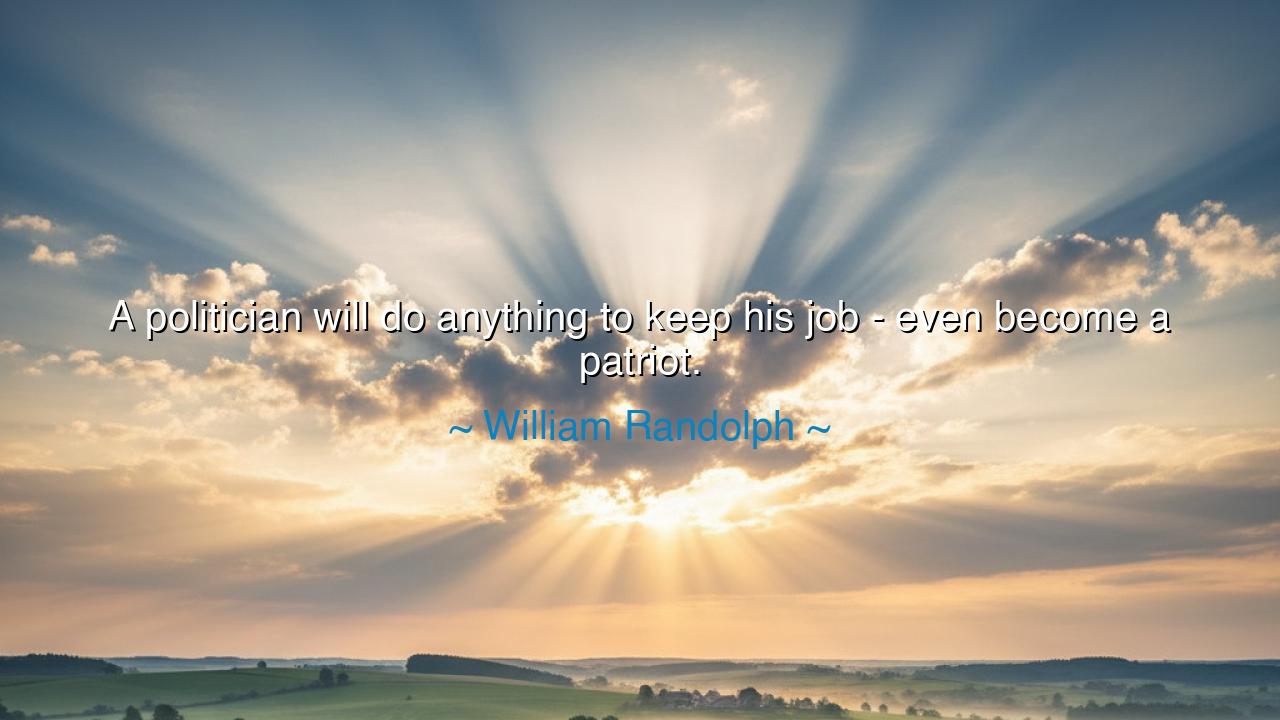
A politician will do anything to keep his job - even become a






William Randolph, sharp observer of men and master of wit, once declared: “A politician will do anything to keep his job—even become a patriot.” In these words lies a double-edged truth: that the mantle of patriotism, sacred and noble, is too often worn not from love of country but from fear of losing power. The politician, desiring office above all, may cloak himself in banners and anthems, not to serve the people, but to preserve himself. Thus, Randolph unmasks the irony that patriotism—the highest of virtues—can be reduced to a tool of survival in the hands of the ambitious.
The origin of this sentiment is as old as politics itself. Randolph lived in an America where the press and politicians were locked in constant battle, where public men sought not only to lead but to preserve their image before the masses. He saw that in moments of crisis, politicians often discovered sudden bursts of patriotism, proclaiming their loyalty with thunderous speeches, while their true aim was not service but security in office. His words remind us that the most dangerous patriotism is that which is feigned.
History offers us many echoes of this truth. In ancient Rome, when the Republic trembled, men like Mark Antony and Octavian wrapped themselves in the language of Rome’s glory. They cried that their actions were for the salvation of the Republic, even as they sought dominion for themselves. Their patriotism was the armor of ambition. Rome’s people, stirred by slogans, often mistook these performances for genuine devotion, until too late they realized that self-preservation, not service, had been the true cause.
So too in America’s own story. During the Red Scare, politicians brandished patriotism as proof of loyalty, denouncing rivals as traitors to elevate themselves. To speak loudly of America became a way to shield one’s career. Yet the loudest cries of “patriot” sometimes concealed the smallest acts of courage. Randolph’s jest was a reminder that true patriotism is measured not in words shouted on the stage, but in sacrifices made when no audience applauds.
Therefore, O seekers of wisdom, learn to weigh the patriotism of leaders. Ask not how loudly they proclaim their love of country, but how deeply they act for the good of the people. For a politician may feign patriotism to keep his post, but a true patriot will risk his post to keep his principles. In this distinction lies the measure of greatness.






VTViet Duong Vuong Thanh
The cynicism in this quote makes me reflect on the state of modern politics. Is the idea that politicians can use patriotism as a tool to retain power something we’ve come to accept as inevitable? How can we differentiate between genuine political leaders who care about their country and those who only use the country’s values for their own benefit? What can we do as voters to encourage authenticity over opportunism in politics?
SNSinh Nhat
This quote brings up an uncomfortable truth about the nature of political power. If a politician is willing to go as far as to adopt a patriotic stance merely to keep their position, does that undermine the idea of leadership itself? Can we expect true leadership from someone who is primarily motivated by staying in office, or does true patriotism require sacrifice and integrity beyond political gamesmanship?
NTNgoc Tram
I find this quote thought-provoking, as it touches on the blurry line between patriotism and self-interest in politics. Should patriotism ever be associated with job security, or should it stand alone as an ideal? If politicians are using patriotism to advance their careers, how can we, as citizens, ensure that their actions match their words? How do we hold them accountable for maintaining true commitment to the nation, not just to their re-election?
TTMai Trang Tran
This quote is a rather cynical view of politicians and their motivations. While it’s true that some politicians may align themselves with patriotic causes to retain power, is this really all politicians, or just those who are less genuine in their leadership? Does the pursuit of power overshadow the desire to serve the public, and if so, what can be done to restore integrity and authenticity in politics?
NNguyen
William Randolph’s statement seems to reflect the idea that patriotism can sometimes be used as a political tool. But does this undermine the genuine love for one’s country, or is it simply an indication of how politics often operates? Can a politician truly be patriotic, or is their patriotism always tied to their own political interests? How do we discern between real patriotism and political posturing?